Ethics and Governance: Examining Uber and Deliveroo's Practices
VerifiedAdded on 2021/04/17
|11
|2956
|80
Essay
AI Summary
This essay delves into the ethical and governance issues surrounding platform-based peer production systems, using Uber and Deliveroo as case studies. It explores the controversies these companies face, including labor practices, worker classification, and allegations of unethical behavior, such as sexual harassment and exploitation of workers. The essay examines these issues through the lenses of utilitarianism, virtue ethics, and deontology, analyzing the stakeholders involved and assessing the companies' actions against these ethical frameworks. The discussion highlights the potential conflicts between the companies' business models, which prioritize growth and expansion, and their ability to adhere to ethical standards, particularly regarding worker rights and customer safety. The essay concludes that, based on the ethical theories discussed, the operations of Uber and Deliveroo raise significant ethical concerns, particularly relating to the treatment of their drivers and couriers, as well as the potential for the companies to engage in unethical practices to achieve their business goals.
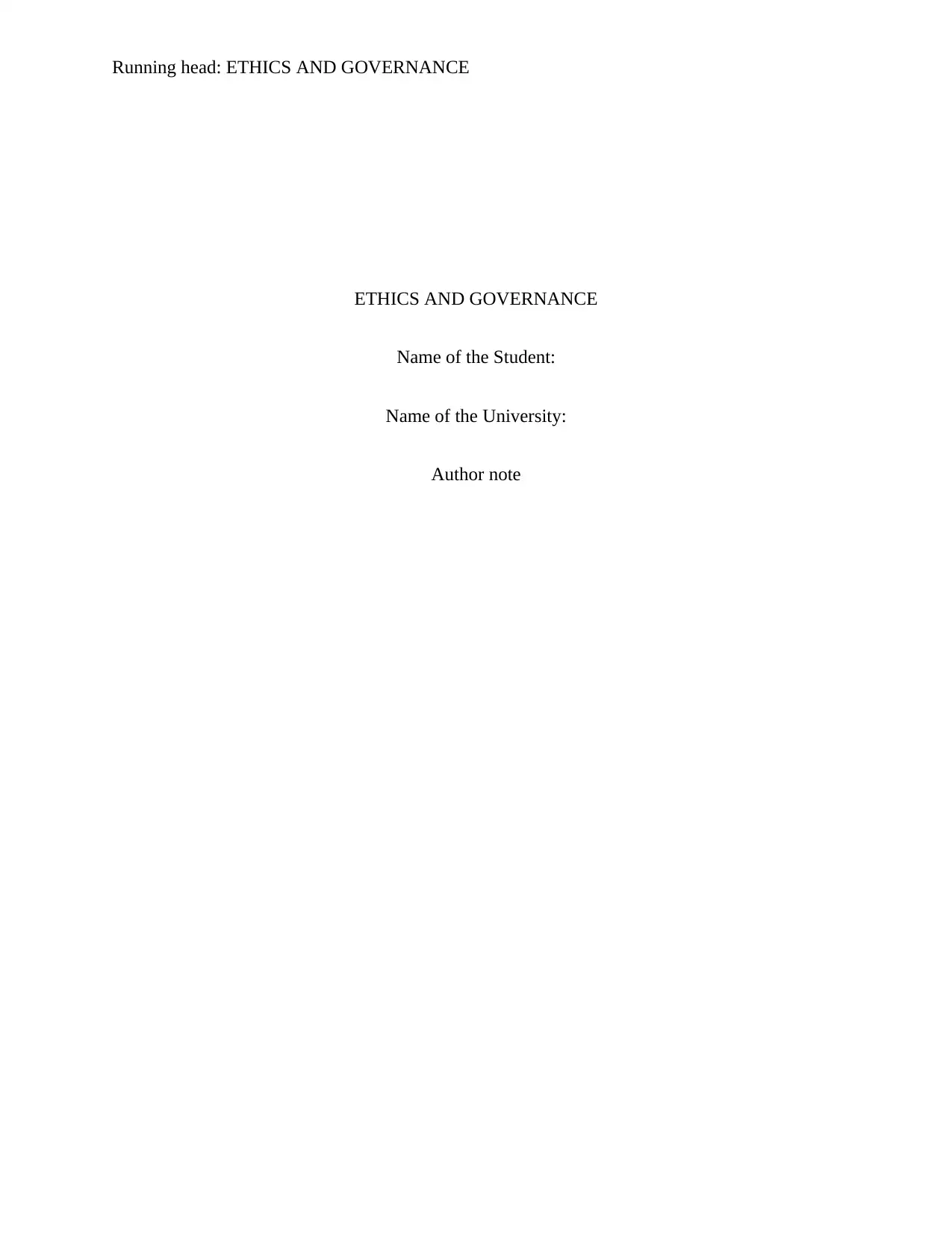
Running head: ETHICS AND GOVERNANCE
ETHICS AND GOVERNANCE
Name of the Student:
Name of the University:
Author note
ETHICS AND GOVERNANCE
Name of the Student:
Name of the University:
Author note
Paraphrase This Document
Need a fresh take? Get an instant paraphrase of this document with our AI Paraphraser
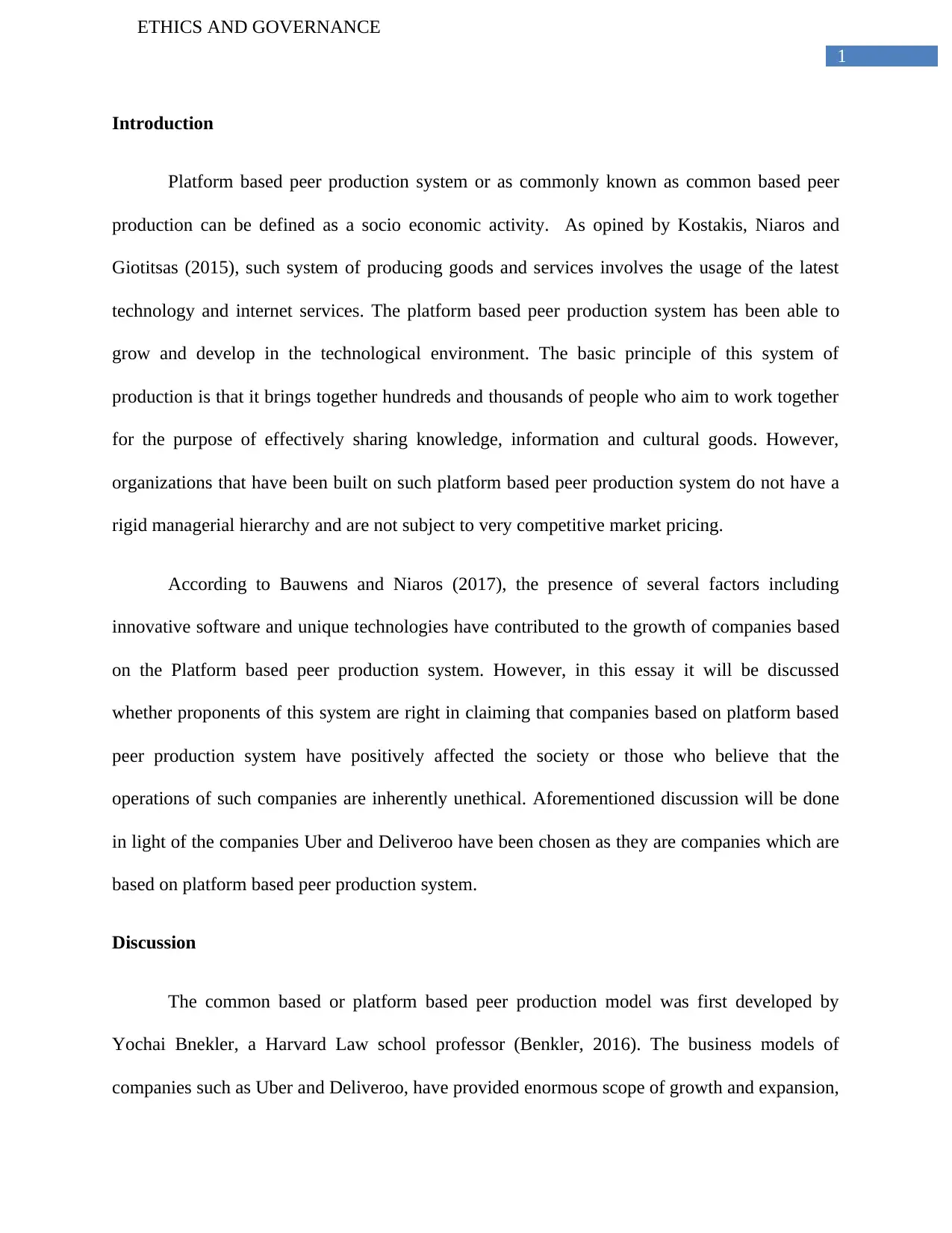
1
ETHICS AND GOVERNANCE
Introduction
Platform based peer production system or as commonly known as common based peer
production can be defined as a socio economic activity. As opined by Kostakis, Niaros and
Giotitsas (2015), such system of producing goods and services involves the usage of the latest
technology and internet services. The platform based peer production system has been able to
grow and develop in the technological environment. The basic principle of this system of
production is that it brings together hundreds and thousands of people who aim to work together
for the purpose of effectively sharing knowledge, information and cultural goods. However,
organizations that have been built on such platform based peer production system do not have a
rigid managerial hierarchy and are not subject to very competitive market pricing.
According to Bauwens and Niaros (2017), the presence of several factors including
innovative software and unique technologies have contributed to the growth of companies based
on the Platform based peer production system. However, in this essay it will be discussed
whether proponents of this system are right in claiming that companies based on platform based
peer production system have positively affected the society or those who believe that the
operations of such companies are inherently unethical. Aforementioned discussion will be done
in light of the companies Uber and Deliveroo have been chosen as they are companies which are
based on platform based peer production system.
Discussion
The common based or platform based peer production model was first developed by
Yochai Bnekler, a Harvard Law school professor (Benkler, 2016). The business models of
companies such as Uber and Deliveroo, have provided enormous scope of growth and expansion,
ETHICS AND GOVERNANCE
Introduction
Platform based peer production system or as commonly known as common based peer
production can be defined as a socio economic activity. As opined by Kostakis, Niaros and
Giotitsas (2015), such system of producing goods and services involves the usage of the latest
technology and internet services. The platform based peer production system has been able to
grow and develop in the technological environment. The basic principle of this system of
production is that it brings together hundreds and thousands of people who aim to work together
for the purpose of effectively sharing knowledge, information and cultural goods. However,
organizations that have been built on such platform based peer production system do not have a
rigid managerial hierarchy and are not subject to very competitive market pricing.
According to Bauwens and Niaros (2017), the presence of several factors including
innovative software and unique technologies have contributed to the growth of companies based
on the Platform based peer production system. However, in this essay it will be discussed
whether proponents of this system are right in claiming that companies based on platform based
peer production system have positively affected the society or those who believe that the
operations of such companies are inherently unethical. Aforementioned discussion will be done
in light of the companies Uber and Deliveroo have been chosen as they are companies which are
based on platform based peer production system.
Discussion
The common based or platform based peer production model was first developed by
Yochai Bnekler, a Harvard Law school professor (Benkler, 2016). The business models of
companies such as Uber and Deliveroo, have provided enormous scope of growth and expansion,
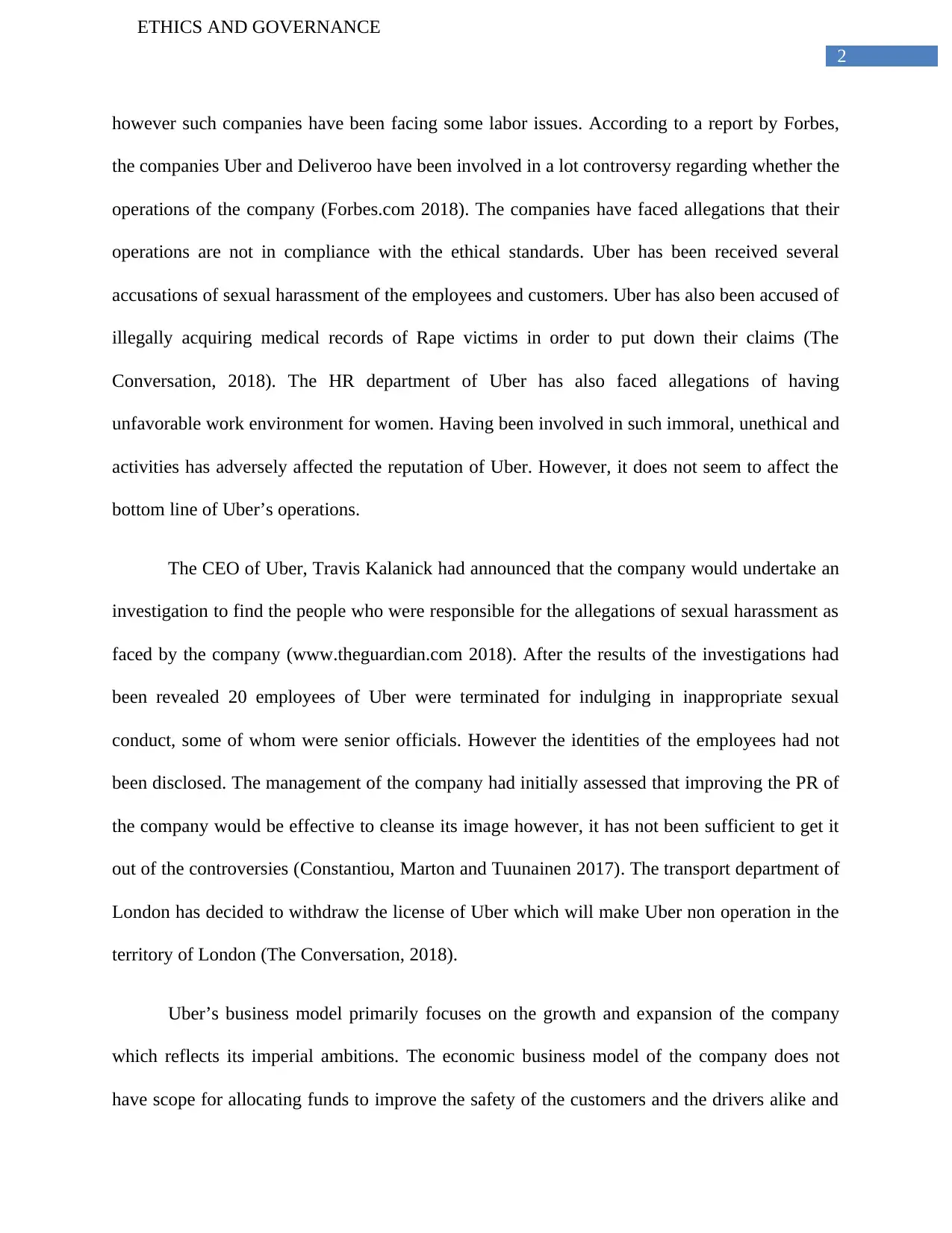
2
ETHICS AND GOVERNANCE
however such companies have been facing some labor issues. According to a report by Forbes,
the companies Uber and Deliveroo have been involved in a lot controversy regarding whether the
operations of the company (Forbes.com 2018). The companies have faced allegations that their
operations are not in compliance with the ethical standards. Uber has been received several
accusations of sexual harassment of the employees and customers. Uber has also been accused of
illegally acquiring medical records of Rape victims in order to put down their claims (The
Conversation, 2018). The HR department of Uber has also faced allegations of having
unfavorable work environment for women. Having been involved in such immoral, unethical and
activities has adversely affected the reputation of Uber. However, it does not seem to affect the
bottom line of Uber’s operations.
The CEO of Uber, Travis Kalanick had announced that the company would undertake an
investigation to find the people who were responsible for the allegations of sexual harassment as
faced by the company (www.theguardian.com 2018). After the results of the investigations had
been revealed 20 employees of Uber were terminated for indulging in inappropriate sexual
conduct, some of whom were senior officials. However the identities of the employees had not
been disclosed. The management of the company had initially assessed that improving the PR of
the company would be effective to cleanse its image however, it has not been sufficient to get it
out of the controversies (Constantiou, Marton and Tuunainen 2017). The transport department of
London has decided to withdraw the license of Uber which will make Uber non operation in the
territory of London (The Conversation, 2018).
Uber’s business model primarily focuses on the growth and expansion of the company
which reflects its imperial ambitions. The economic business model of the company does not
have scope for allocating funds to improve the safety of the customers and the drivers alike and
ETHICS AND GOVERNANCE
however such companies have been facing some labor issues. According to a report by Forbes,
the companies Uber and Deliveroo have been involved in a lot controversy regarding whether the
operations of the company (Forbes.com 2018). The companies have faced allegations that their
operations are not in compliance with the ethical standards. Uber has been received several
accusations of sexual harassment of the employees and customers. Uber has also been accused of
illegally acquiring medical records of Rape victims in order to put down their claims (The
Conversation, 2018). The HR department of Uber has also faced allegations of having
unfavorable work environment for women. Having been involved in such immoral, unethical and
activities has adversely affected the reputation of Uber. However, it does not seem to affect the
bottom line of Uber’s operations.
The CEO of Uber, Travis Kalanick had announced that the company would undertake an
investigation to find the people who were responsible for the allegations of sexual harassment as
faced by the company (www.theguardian.com 2018). After the results of the investigations had
been revealed 20 employees of Uber were terminated for indulging in inappropriate sexual
conduct, some of whom were senior officials. However the identities of the employees had not
been disclosed. The management of the company had initially assessed that improving the PR of
the company would be effective to cleanse its image however, it has not been sufficient to get it
out of the controversies (Constantiou, Marton and Tuunainen 2017). The transport department of
London has decided to withdraw the license of Uber which will make Uber non operation in the
territory of London (The Conversation, 2018).
Uber’s business model primarily focuses on the growth and expansion of the company
which reflects its imperial ambitions. The economic business model of the company does not
have scope for allocating funds to improve the safety of the customers and the drivers alike and
⊘ This is a preview!⊘
Do you want full access?
Subscribe today to unlock all pages.

Trusted by 1+ million students worldwide
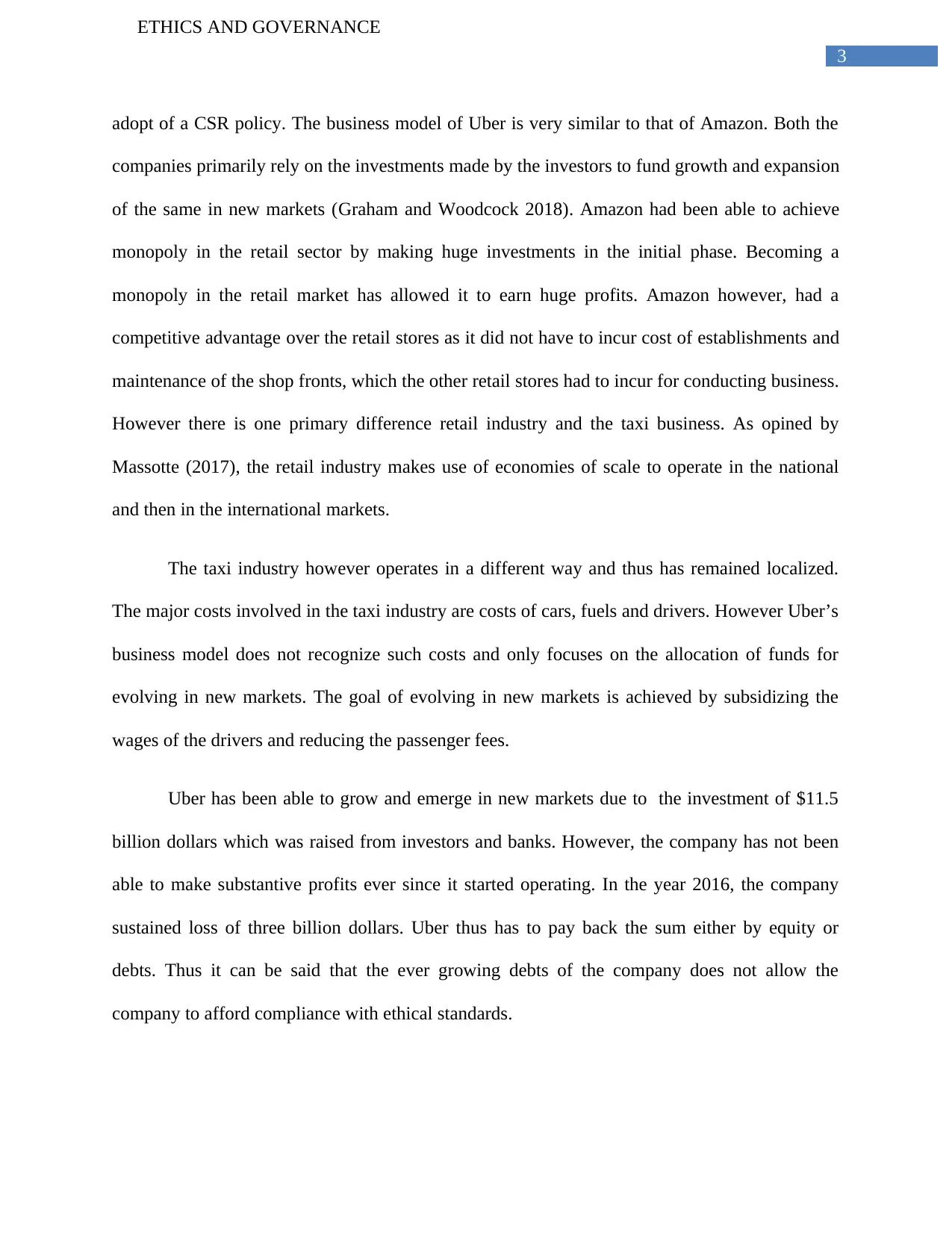
3
ETHICS AND GOVERNANCE
adopt of a CSR policy. The business model of Uber is very similar to that of Amazon. Both the
companies primarily rely on the investments made by the investors to fund growth and expansion
of the same in new markets (Graham and Woodcock 2018). Amazon had been able to achieve
monopoly in the retail sector by making huge investments in the initial phase. Becoming a
monopoly in the retail market has allowed it to earn huge profits. Amazon however, had a
competitive advantage over the retail stores as it did not have to incur cost of establishments and
maintenance of the shop fronts, which the other retail stores had to incur for conducting business.
However there is one primary difference retail industry and the taxi business. As opined by
Massotte (2017), the retail industry makes use of economies of scale to operate in the national
and then in the international markets.
The taxi industry however operates in a different way and thus has remained localized.
The major costs involved in the taxi industry are costs of cars, fuels and drivers. However Uber’s
business model does not recognize such costs and only focuses on the allocation of funds for
evolving in new markets. The goal of evolving in new markets is achieved by subsidizing the
wages of the drivers and reducing the passenger fees.
Uber has been able to grow and emerge in new markets due to the investment of $11.5
billion dollars which was raised from investors and banks. However, the company has not been
able to make substantive profits ever since it started operating. In the year 2016, the company
sustained loss of three billion dollars. Uber thus has to pay back the sum either by equity or
debts. Thus it can be said that the ever growing debts of the company does not allow the
company to afford compliance with ethical standards.
ETHICS AND GOVERNANCE
adopt of a CSR policy. The business model of Uber is very similar to that of Amazon. Both the
companies primarily rely on the investments made by the investors to fund growth and expansion
of the same in new markets (Graham and Woodcock 2018). Amazon had been able to achieve
monopoly in the retail sector by making huge investments in the initial phase. Becoming a
monopoly in the retail market has allowed it to earn huge profits. Amazon however, had a
competitive advantage over the retail stores as it did not have to incur cost of establishments and
maintenance of the shop fronts, which the other retail stores had to incur for conducting business.
However there is one primary difference retail industry and the taxi business. As opined by
Massotte (2017), the retail industry makes use of economies of scale to operate in the national
and then in the international markets.
The taxi industry however operates in a different way and thus has remained localized.
The major costs involved in the taxi industry are costs of cars, fuels and drivers. However Uber’s
business model does not recognize such costs and only focuses on the allocation of funds for
evolving in new markets. The goal of evolving in new markets is achieved by subsidizing the
wages of the drivers and reducing the passenger fees.
Uber has been able to grow and emerge in new markets due to the investment of $11.5
billion dollars which was raised from investors and banks. However, the company has not been
able to make substantive profits ever since it started operating. In the year 2016, the company
sustained loss of three billion dollars. Uber thus has to pay back the sum either by equity or
debts. Thus it can be said that the ever growing debts of the company does not allow the
company to afford compliance with ethical standards.
Paraphrase This Document
Need a fresh take? Get an instant paraphrase of this document with our AI Paraphraser
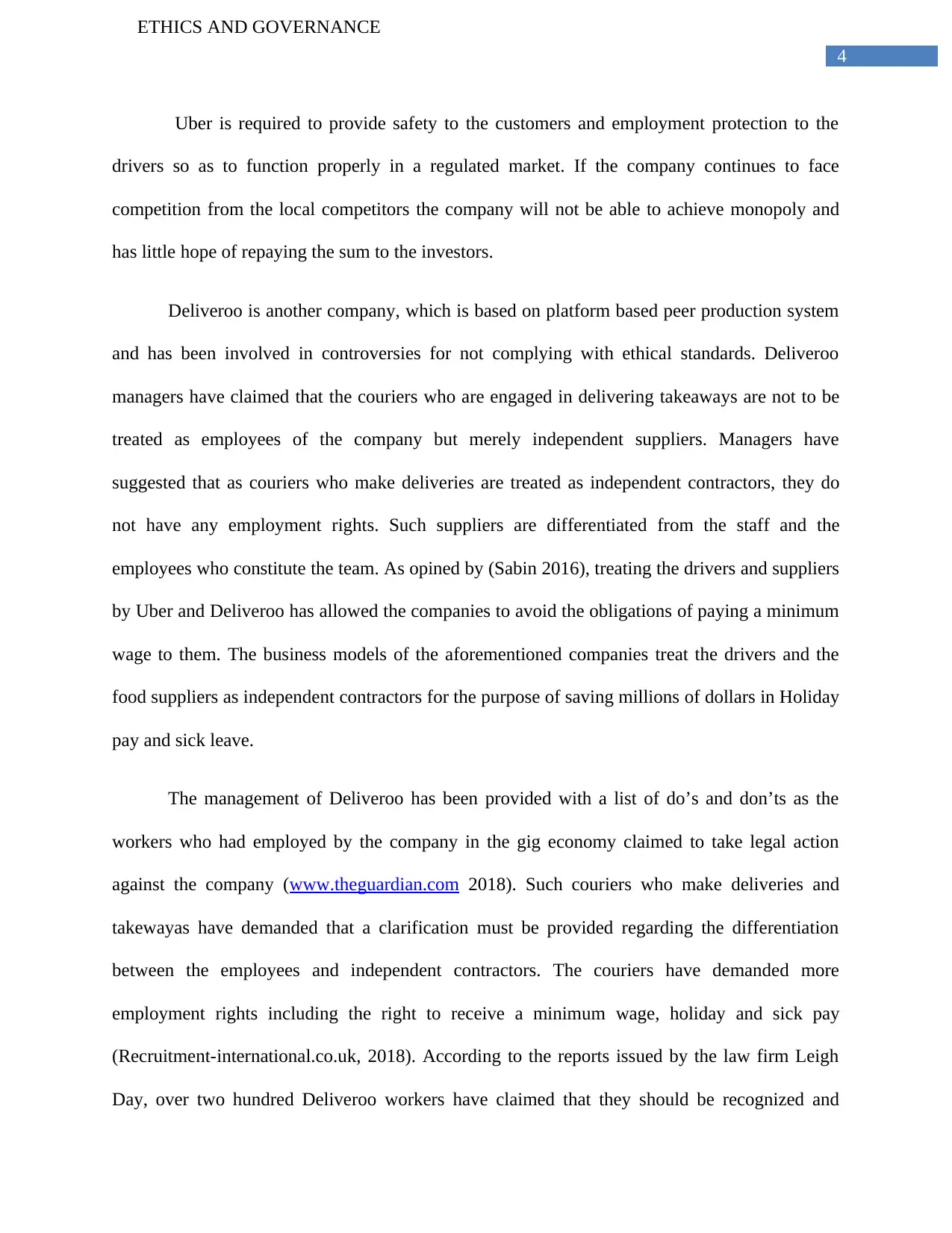
4
ETHICS AND GOVERNANCE
Uber is required to provide safety to the customers and employment protection to the
drivers so as to function properly in a regulated market. If the company continues to face
competition from the local competitors the company will not be able to achieve monopoly and
has little hope of repaying the sum to the investors.
Deliveroo is another company, which is based on platform based peer production system
and has been involved in controversies for not complying with ethical standards. Deliveroo
managers have claimed that the couriers who are engaged in delivering takeaways are not to be
treated as employees of the company but merely independent suppliers. Managers have
suggested that as couriers who make deliveries are treated as independent contractors, they do
not have any employment rights. Such suppliers are differentiated from the staff and the
employees who constitute the team. As opined by (Sabin 2016), treating the drivers and suppliers
by Uber and Deliveroo has allowed the companies to avoid the obligations of paying a minimum
wage to them. The business models of the aforementioned companies treat the drivers and the
food suppliers as independent contractors for the purpose of saving millions of dollars in Holiday
pay and sick leave.
The management of Deliveroo has been provided with a list of do’s and don’ts as the
workers who had employed by the company in the gig economy claimed to take legal action
against the company (www.theguardian.com 2018). Such couriers who make deliveries and
takewayas have demanded that a clarification must be provided regarding the differentiation
between the employees and independent contractors. The couriers have demanded more
employment rights including the right to receive a minimum wage, holiday and sick pay
(Recruitment-international.co.uk, 2018). According to the reports issued by the law firm Leigh
Day, over two hundred Deliveroo workers have claimed that they should be recognized and
ETHICS AND GOVERNANCE
Uber is required to provide safety to the customers and employment protection to the
drivers so as to function properly in a regulated market. If the company continues to face
competition from the local competitors the company will not be able to achieve monopoly and
has little hope of repaying the sum to the investors.
Deliveroo is another company, which is based on platform based peer production system
and has been involved in controversies for not complying with ethical standards. Deliveroo
managers have claimed that the couriers who are engaged in delivering takeaways are not to be
treated as employees of the company but merely independent suppliers. Managers have
suggested that as couriers who make deliveries are treated as independent contractors, they do
not have any employment rights. Such suppliers are differentiated from the staff and the
employees who constitute the team. As opined by (Sabin 2016), treating the drivers and suppliers
by Uber and Deliveroo has allowed the companies to avoid the obligations of paying a minimum
wage to them. The business models of the aforementioned companies treat the drivers and the
food suppliers as independent contractors for the purpose of saving millions of dollars in Holiday
pay and sick leave.
The management of Deliveroo has been provided with a list of do’s and don’ts as the
workers who had employed by the company in the gig economy claimed to take legal action
against the company (www.theguardian.com 2018). Such couriers who make deliveries and
takewayas have demanded that a clarification must be provided regarding the differentiation
between the employees and independent contractors. The couriers have demanded more
employment rights including the right to receive a minimum wage, holiday and sick pay
(Recruitment-international.co.uk, 2018). According to the reports issued by the law firm Leigh
Day, over two hundred Deliveroo workers have claimed that they should be recognized and
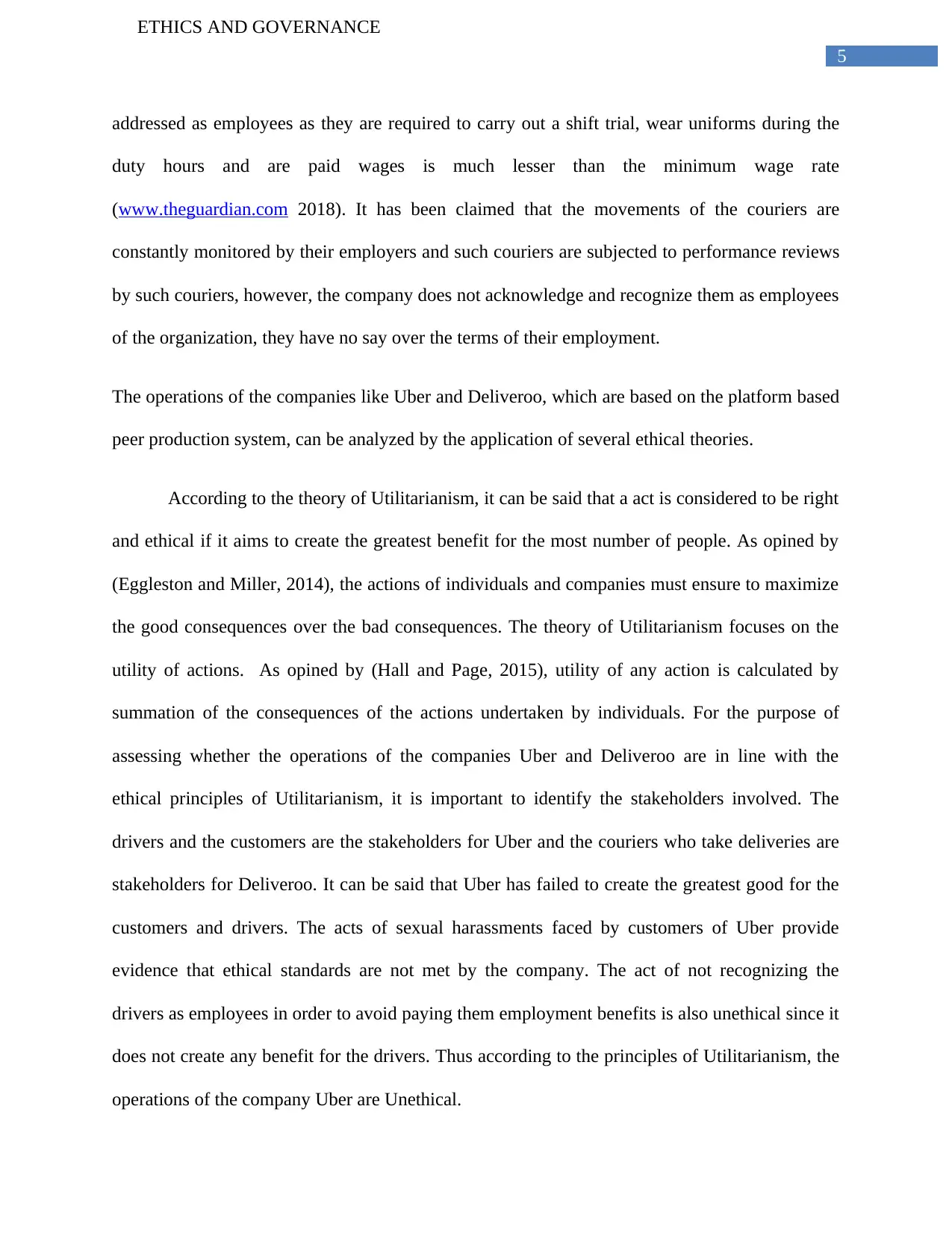
5
ETHICS AND GOVERNANCE
addressed as employees as they are required to carry out a shift trial, wear uniforms during the
duty hours and are paid wages is much lesser than the minimum wage rate
(www.theguardian.com 2018). It has been claimed that the movements of the couriers are
constantly monitored by their employers and such couriers are subjected to performance reviews
by such couriers, however, the company does not acknowledge and recognize them as employees
of the organization, they have no say over the terms of their employment.
The operations of the companies like Uber and Deliveroo, which are based on the platform based
peer production system, can be analyzed by the application of several ethical theories.
According to the theory of Utilitarianism, it can be said that a act is considered to be right
and ethical if it aims to create the greatest benefit for the most number of people. As opined by
(Eggleston and Miller, 2014), the actions of individuals and companies must ensure to maximize
the good consequences over the bad consequences. The theory of Utilitarianism focuses on the
utility of actions. As opined by (Hall and Page, 2015), utility of any action is calculated by
summation of the consequences of the actions undertaken by individuals. For the purpose of
assessing whether the operations of the companies Uber and Deliveroo are in line with the
ethical principles of Utilitarianism, it is important to identify the stakeholders involved. The
drivers and the customers are the stakeholders for Uber and the couriers who take deliveries are
stakeholders for Deliveroo. It can be said that Uber has failed to create the greatest good for the
customers and drivers. The acts of sexual harassments faced by customers of Uber provide
evidence that ethical standards are not met by the company. The act of not recognizing the
drivers as employees in order to avoid paying them employment benefits is also unethical since it
does not create any benefit for the drivers. Thus according to the principles of Utilitarianism, the
operations of the company Uber are Unethical.
ETHICS AND GOVERNANCE
addressed as employees as they are required to carry out a shift trial, wear uniforms during the
duty hours and are paid wages is much lesser than the minimum wage rate
(www.theguardian.com 2018). It has been claimed that the movements of the couriers are
constantly monitored by their employers and such couriers are subjected to performance reviews
by such couriers, however, the company does not acknowledge and recognize them as employees
of the organization, they have no say over the terms of their employment.
The operations of the companies like Uber and Deliveroo, which are based on the platform based
peer production system, can be analyzed by the application of several ethical theories.
According to the theory of Utilitarianism, it can be said that a act is considered to be right
and ethical if it aims to create the greatest benefit for the most number of people. As opined by
(Eggleston and Miller, 2014), the actions of individuals and companies must ensure to maximize
the good consequences over the bad consequences. The theory of Utilitarianism focuses on the
utility of actions. As opined by (Hall and Page, 2015), utility of any action is calculated by
summation of the consequences of the actions undertaken by individuals. For the purpose of
assessing whether the operations of the companies Uber and Deliveroo are in line with the
ethical principles of Utilitarianism, it is important to identify the stakeholders involved. The
drivers and the customers are the stakeholders for Uber and the couriers who take deliveries are
stakeholders for Deliveroo. It can be said that Uber has failed to create the greatest good for the
customers and drivers. The acts of sexual harassments faced by customers of Uber provide
evidence that ethical standards are not met by the company. The act of not recognizing the
drivers as employees in order to avoid paying them employment benefits is also unethical since it
does not create any benefit for the drivers. Thus according to the principles of Utilitarianism, the
operations of the company Uber are Unethical.
⊘ This is a preview!⊘
Do you want full access?
Subscribe today to unlock all pages.

Trusted by 1+ million students worldwide
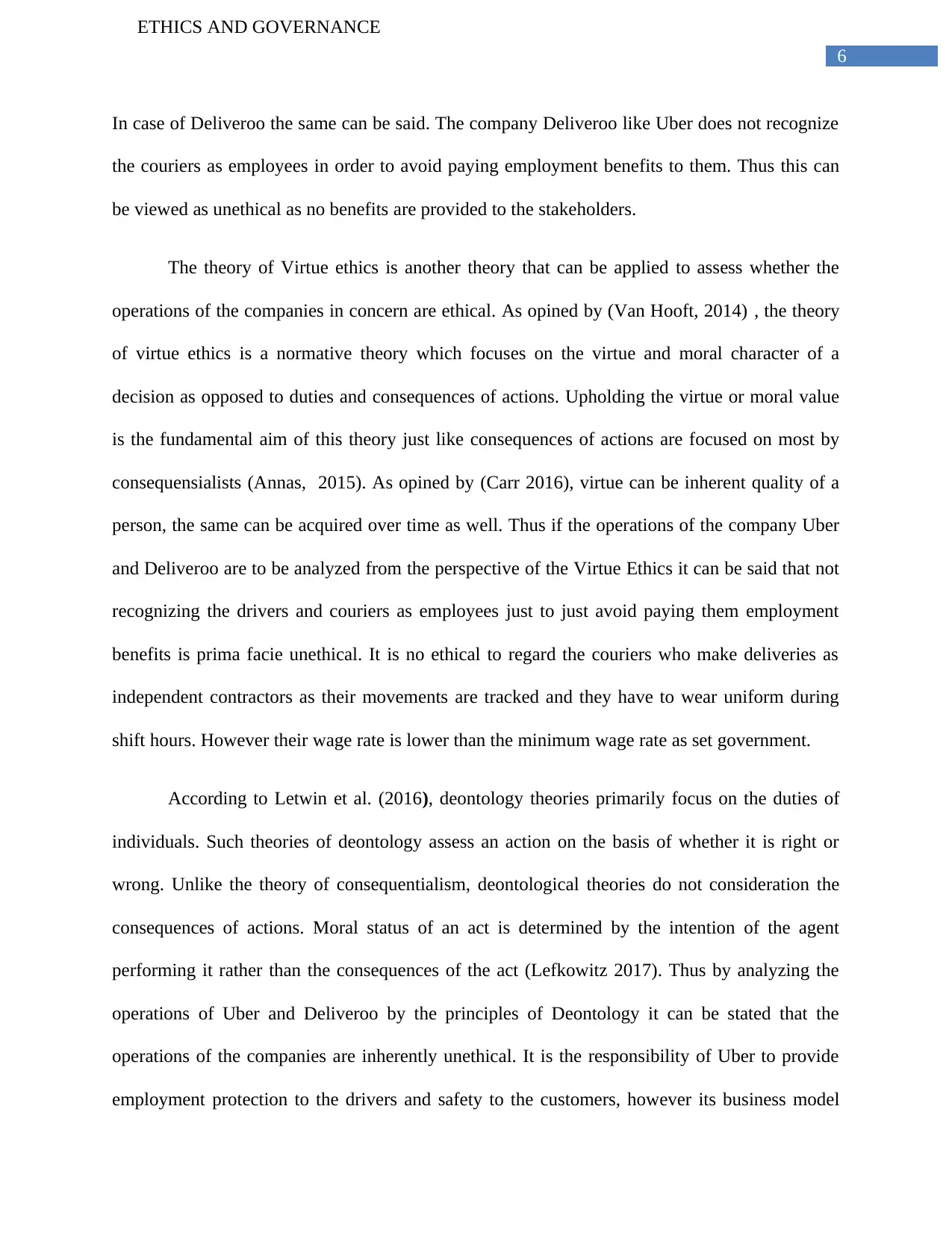
6
ETHICS AND GOVERNANCE
In case of Deliveroo the same can be said. The company Deliveroo like Uber does not recognize
the couriers as employees in order to avoid paying employment benefits to them. Thus this can
be viewed as unethical as no benefits are provided to the stakeholders.
The theory of Virtue ethics is another theory that can be applied to assess whether the
operations of the companies in concern are ethical. As opined by (Van Hooft, 2014) , the theory
of virtue ethics is a normative theory which focuses on the virtue and moral character of a
decision as opposed to duties and consequences of actions. Upholding the virtue or moral value
is the fundamental aim of this theory just like consequences of actions are focused on most by
consequensialists (Annas, 2015). As opined by (Carr 2016), virtue can be inherent quality of a
person, the same can be acquired over time as well. Thus if the operations of the company Uber
and Deliveroo are to be analyzed from the perspective of the Virtue Ethics it can be said that not
recognizing the drivers and couriers as employees just to just avoid paying them employment
benefits is prima facie unethical. It is no ethical to regard the couriers who make deliveries as
independent contractors as their movements are tracked and they have to wear uniform during
shift hours. However their wage rate is lower than the minimum wage rate as set government.
According to Letwin et al. (2016), deontology theories primarily focus on the duties of
individuals. Such theories of deontology assess an action on the basis of whether it is right or
wrong. Unlike the theory of consequentialism, deontological theories do not consideration the
consequences of actions. Moral status of an act is determined by the intention of the agent
performing it rather than the consequences of the act (Lefkowitz 2017). Thus by analyzing the
operations of Uber and Deliveroo by the principles of Deontology it can be stated that the
operations of the companies are inherently unethical. It is the responsibility of Uber to provide
employment protection to the drivers and safety to the customers, however its business model
ETHICS AND GOVERNANCE
In case of Deliveroo the same can be said. The company Deliveroo like Uber does not recognize
the couriers as employees in order to avoid paying employment benefits to them. Thus this can
be viewed as unethical as no benefits are provided to the stakeholders.
The theory of Virtue ethics is another theory that can be applied to assess whether the
operations of the companies in concern are ethical. As opined by (Van Hooft, 2014) , the theory
of virtue ethics is a normative theory which focuses on the virtue and moral character of a
decision as opposed to duties and consequences of actions. Upholding the virtue or moral value
is the fundamental aim of this theory just like consequences of actions are focused on most by
consequensialists (Annas, 2015). As opined by (Carr 2016), virtue can be inherent quality of a
person, the same can be acquired over time as well. Thus if the operations of the company Uber
and Deliveroo are to be analyzed from the perspective of the Virtue Ethics it can be said that not
recognizing the drivers and couriers as employees just to just avoid paying them employment
benefits is prima facie unethical. It is no ethical to regard the couriers who make deliveries as
independent contractors as their movements are tracked and they have to wear uniform during
shift hours. However their wage rate is lower than the minimum wage rate as set government.
According to Letwin et al. (2016), deontology theories primarily focus on the duties of
individuals. Such theories of deontology assess an action on the basis of whether it is right or
wrong. Unlike the theory of consequentialism, deontological theories do not consideration the
consequences of actions. Moral status of an act is determined by the intention of the agent
performing it rather than the consequences of the act (Lefkowitz 2017). Thus by analyzing the
operations of Uber and Deliveroo by the principles of Deontology it can be stated that the
operations of the companies are inherently unethical. It is the responsibility of Uber to provide
employment protection to the drivers and safety to the customers, however its business model
Paraphrase This Document
Need a fresh take? Get an instant paraphrase of this document with our AI Paraphraser
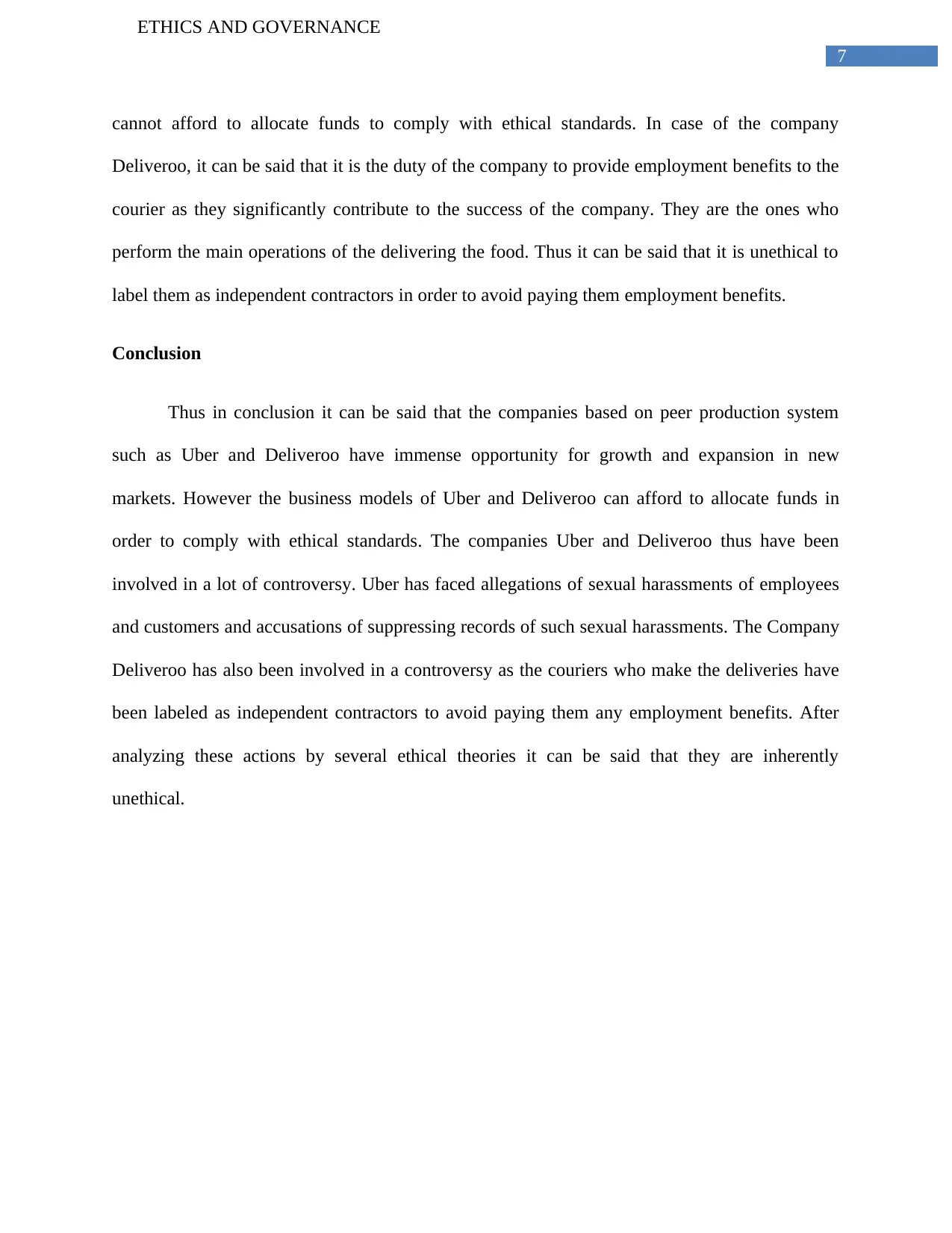
7
ETHICS AND GOVERNANCE
cannot afford to allocate funds to comply with ethical standards. In case of the company
Deliveroo, it can be said that it is the duty of the company to provide employment benefits to the
courier as they significantly contribute to the success of the company. They are the ones who
perform the main operations of the delivering the food. Thus it can be said that it is unethical to
label them as independent contractors in order to avoid paying them employment benefits.
Conclusion
Thus in conclusion it can be said that the companies based on peer production system
such as Uber and Deliveroo have immense opportunity for growth and expansion in new
markets. However the business models of Uber and Deliveroo can afford to allocate funds in
order to comply with ethical standards. The companies Uber and Deliveroo thus have been
involved in a lot of controversy. Uber has faced allegations of sexual harassments of employees
and customers and accusations of suppressing records of such sexual harassments. The Company
Deliveroo has also been involved in a controversy as the couriers who make the deliveries have
been labeled as independent contractors to avoid paying them any employment benefits. After
analyzing these actions by several ethical theories it can be said that they are inherently
unethical.
ETHICS AND GOVERNANCE
cannot afford to allocate funds to comply with ethical standards. In case of the company
Deliveroo, it can be said that it is the duty of the company to provide employment benefits to the
courier as they significantly contribute to the success of the company. They are the ones who
perform the main operations of the delivering the food. Thus it can be said that it is unethical to
label them as independent contractors in order to avoid paying them employment benefits.
Conclusion
Thus in conclusion it can be said that the companies based on peer production system
such as Uber and Deliveroo have immense opportunity for growth and expansion in new
markets. However the business models of Uber and Deliveroo can afford to allocate funds in
order to comply with ethical standards. The companies Uber and Deliveroo thus have been
involved in a lot of controversy. Uber has faced allegations of sexual harassments of employees
and customers and accusations of suppressing records of such sexual harassments. The Company
Deliveroo has also been involved in a controversy as the couriers who make the deliveries have
been labeled as independent contractors to avoid paying them any employment benefits. After
analyzing these actions by several ethical theories it can be said that they are inherently
unethical.
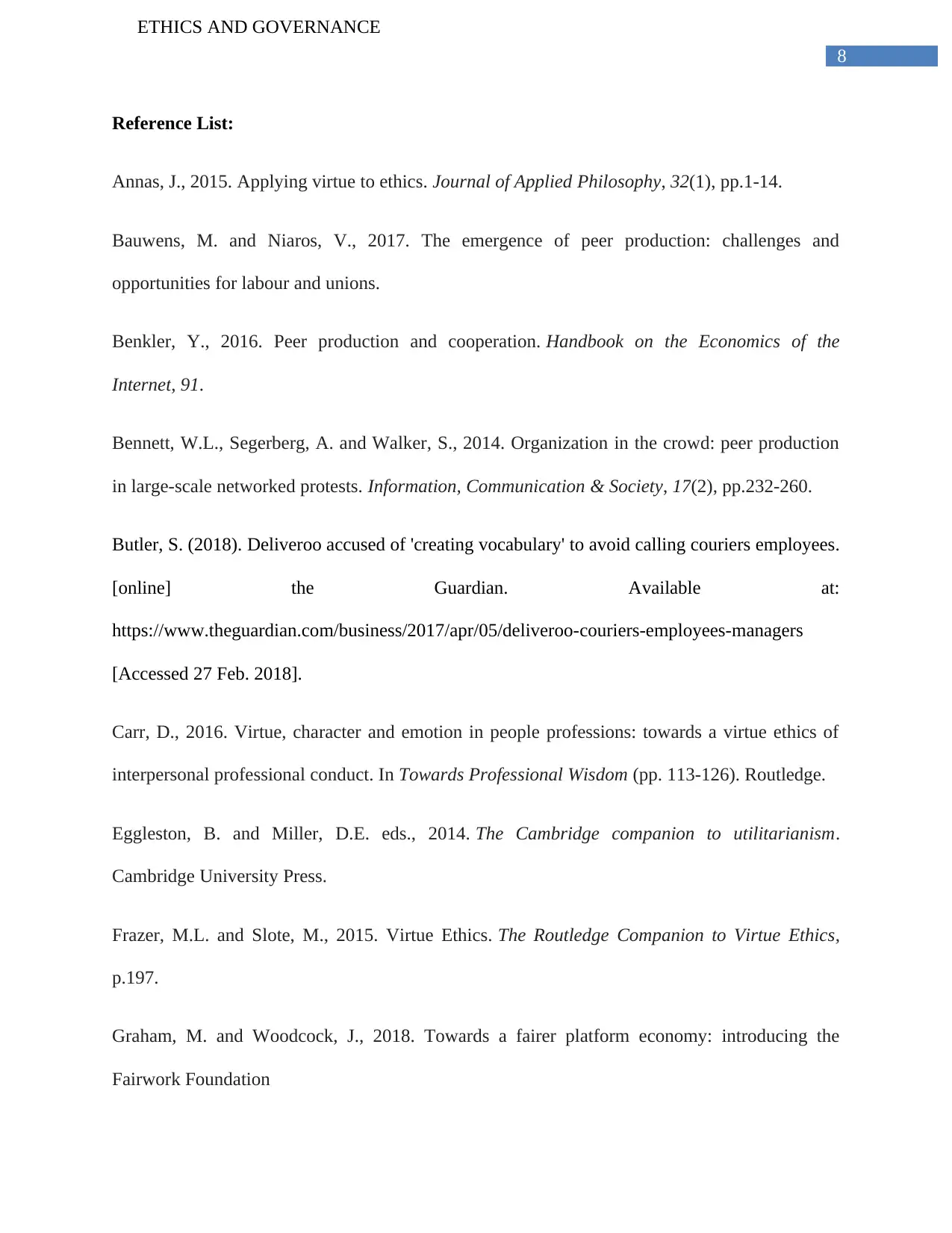
8
ETHICS AND GOVERNANCE
Reference List:
Annas, J., 2015. Applying virtue to ethics. Journal of Applied Philosophy, 32(1), pp.1-14.
Bauwens, M. and Niaros, V., 2017. The emergence of peer production: challenges and
opportunities for labour and unions.
Benkler, Y., 2016. Peer production and cooperation. Handbook on the Economics of the
Internet, 91.
Bennett, W.L., Segerberg, A. and Walker, S., 2014. Organization in the crowd: peer production
in large-scale networked protests. Information, Communication & Society, 17(2), pp.232-260.
Butler, S. (2018). Deliveroo accused of 'creating vocabulary' to avoid calling couriers employees.
[online] the Guardian. Available at:
https://www.theguardian.com/business/2017/apr/05/deliveroo-couriers-employees-managers
[Accessed 27 Feb. 2018].
Carr, D., 2016. Virtue, character and emotion in people professions: towards a virtue ethics of
interpersonal professional conduct. In Towards Professional Wisdom (pp. 113-126). Routledge.
Eggleston, B. and Miller, D.E. eds., 2014. The Cambridge companion to utilitarianism.
Cambridge University Press.
Frazer, M.L. and Slote, M., 2015. Virtue Ethics. The Routledge Companion to Virtue Ethics,
p.197.
Graham, M. and Woodcock, J., 2018. Towards a fairer platform economy: introducing the
Fairwork Foundation
ETHICS AND GOVERNANCE
Reference List:
Annas, J., 2015. Applying virtue to ethics. Journal of Applied Philosophy, 32(1), pp.1-14.
Bauwens, M. and Niaros, V., 2017. The emergence of peer production: challenges and
opportunities for labour and unions.
Benkler, Y., 2016. Peer production and cooperation. Handbook on the Economics of the
Internet, 91.
Bennett, W.L., Segerberg, A. and Walker, S., 2014. Organization in the crowd: peer production
in large-scale networked protests. Information, Communication & Society, 17(2), pp.232-260.
Butler, S. (2018). Deliveroo accused of 'creating vocabulary' to avoid calling couriers employees.
[online] the Guardian. Available at:
https://www.theguardian.com/business/2017/apr/05/deliveroo-couriers-employees-managers
[Accessed 27 Feb. 2018].
Carr, D., 2016. Virtue, character and emotion in people professions: towards a virtue ethics of
interpersonal professional conduct. In Towards Professional Wisdom (pp. 113-126). Routledge.
Eggleston, B. and Miller, D.E. eds., 2014. The Cambridge companion to utilitarianism.
Cambridge University Press.
Frazer, M.L. and Slote, M., 2015. Virtue Ethics. The Routledge Companion to Virtue Ethics,
p.197.
Graham, M. and Woodcock, J., 2018. Towards a fairer platform economy: introducing the
Fairwork Foundation
⊘ This is a preview!⊘
Do you want full access?
Subscribe today to unlock all pages.

Trusted by 1+ million students worldwide
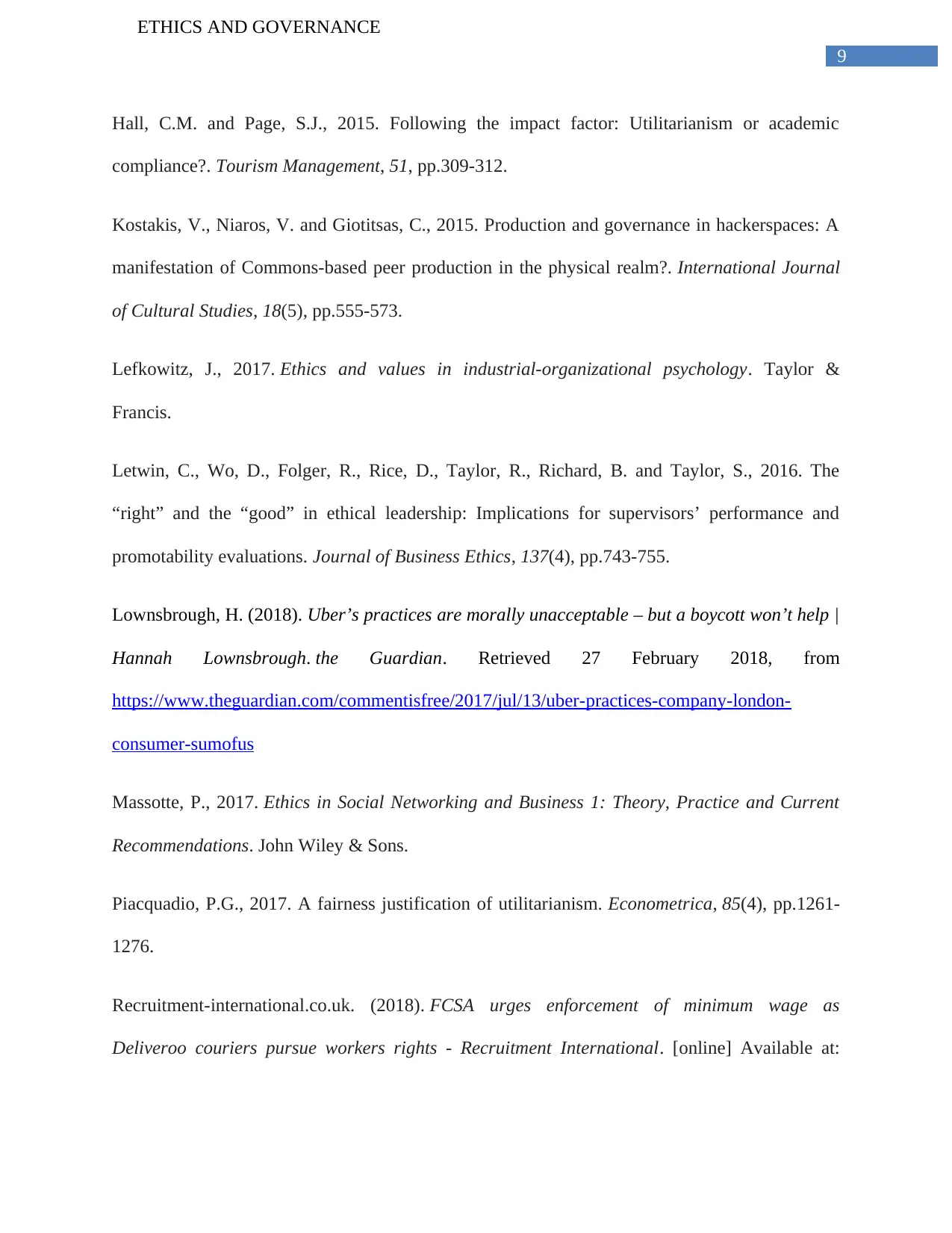
9
ETHICS AND GOVERNANCE
Hall, C.M. and Page, S.J., 2015. Following the impact factor: Utilitarianism or academic
compliance?. Tourism Management, 51, pp.309-312.
Kostakis, V., Niaros, V. and Giotitsas, C., 2015. Production and governance in hackerspaces: A
manifestation of Commons-based peer production in the physical realm?. International Journal
of Cultural Studies, 18(5), pp.555-573.
Lefkowitz, J., 2017. Ethics and values in industrial-organizational psychology. Taylor &
Francis.
Letwin, C., Wo, D., Folger, R., Rice, D., Taylor, R., Richard, B. and Taylor, S., 2016. The
“right” and the “good” in ethical leadership: Implications for supervisors’ performance and
promotability evaluations. Journal of Business Ethics, 137(4), pp.743-755.
Lownsbrough, H. (2018). Uber’s practices are morally unacceptable – but a boycott won’t help |
Hannah Lownsbrough. the Guardian. Retrieved 27 February 2018, from
https://www.theguardian.com/commentisfree/2017/jul/13/uber-practices-company-london-
consumer-sumofus
Massotte, P., 2017. Ethics in Social Networking and Business 1: Theory, Practice and Current
Recommendations. John Wiley & Sons.
Piacquadio, P.G., 2017. A fairness justification of utilitarianism. Econometrica, 85(4), pp.1261-
1276.
Recruitment-international.co.uk. (2018). FCSA urges enforcement of minimum wage as
Deliveroo couriers pursue workers rights - Recruitment International. [online] Available at:
ETHICS AND GOVERNANCE
Hall, C.M. and Page, S.J., 2015. Following the impact factor: Utilitarianism or academic
compliance?. Tourism Management, 51, pp.309-312.
Kostakis, V., Niaros, V. and Giotitsas, C., 2015. Production and governance in hackerspaces: A
manifestation of Commons-based peer production in the physical realm?. International Journal
of Cultural Studies, 18(5), pp.555-573.
Lefkowitz, J., 2017. Ethics and values in industrial-organizational psychology. Taylor &
Francis.
Letwin, C., Wo, D., Folger, R., Rice, D., Taylor, R., Richard, B. and Taylor, S., 2016. The
“right” and the “good” in ethical leadership: Implications for supervisors’ performance and
promotability evaluations. Journal of Business Ethics, 137(4), pp.743-755.
Lownsbrough, H. (2018). Uber’s practices are morally unacceptable – but a boycott won’t help |
Hannah Lownsbrough. the Guardian. Retrieved 27 February 2018, from
https://www.theguardian.com/commentisfree/2017/jul/13/uber-practices-company-london-
consumer-sumofus
Massotte, P., 2017. Ethics in Social Networking and Business 1: Theory, Practice and Current
Recommendations. John Wiley & Sons.
Piacquadio, P.G., 2017. A fairness justification of utilitarianism. Econometrica, 85(4), pp.1261-
1276.
Recruitment-international.co.uk. (2018). FCSA urges enforcement of minimum wage as
Deliveroo couriers pursue workers rights - Recruitment International. [online] Available at:
Paraphrase This Document
Need a fresh take? Get an instant paraphrase of this document with our AI Paraphraser
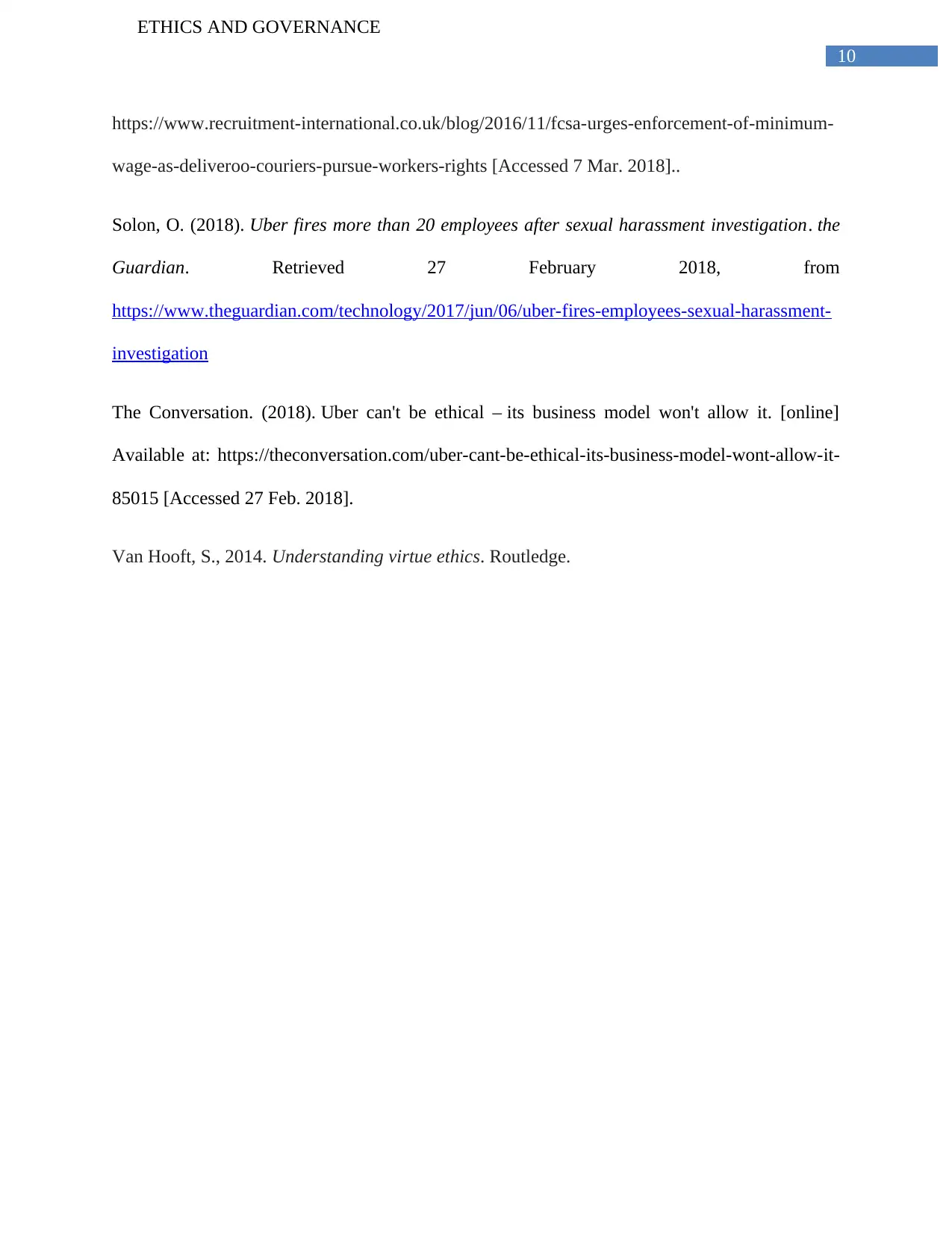
10
ETHICS AND GOVERNANCE
https://www.recruitment-international.co.uk/blog/2016/11/fcsa-urges-enforcement-of-minimum-
wage-as-deliveroo-couriers-pursue-workers-rights [Accessed 7 Mar. 2018]..
Solon, O. (2018). Uber fires more than 20 employees after sexual harassment investigation. the
Guardian. Retrieved 27 February 2018, from
https://www.theguardian.com/technology/2017/jun/06/uber-fires-employees-sexual-harassment-
investigation
The Conversation. (2018). Uber can't be ethical – its business model won't allow it. [online]
Available at: https://theconversation.com/uber-cant-be-ethical-its-business-model-wont-allow-it-
85015 [Accessed 27 Feb. 2018].
Van Hooft, S., 2014. Understanding virtue ethics. Routledge.
ETHICS AND GOVERNANCE
https://www.recruitment-international.co.uk/blog/2016/11/fcsa-urges-enforcement-of-minimum-
wage-as-deliveroo-couriers-pursue-workers-rights [Accessed 7 Mar. 2018]..
Solon, O. (2018). Uber fires more than 20 employees after sexual harassment investigation. the
Guardian. Retrieved 27 February 2018, from
https://www.theguardian.com/technology/2017/jun/06/uber-fires-employees-sexual-harassment-
investigation
The Conversation. (2018). Uber can't be ethical – its business model won't allow it. [online]
Available at: https://theconversation.com/uber-cant-be-ethical-its-business-model-wont-allow-it-
85015 [Accessed 27 Feb. 2018].
Van Hooft, S., 2014. Understanding virtue ethics. Routledge.
1 out of 11
Related Documents
Your All-in-One AI-Powered Toolkit for Academic Success.
+13062052269
info@desklib.com
Available 24*7 on WhatsApp / Email
![[object Object]](/_next/static/media/star-bottom.7253800d.svg)
Unlock your academic potential
Copyright © 2020–2026 A2Z Services. All Rights Reserved. Developed and managed by ZUCOL.





